Key takeaways
- Understanding programming tutorials requires engaging with the content actively, experimenting, and grasping the underlying concepts rather than just following steps.
- Online forums provide a supportive community where diverse perspectives and immediate feedback enhance learning and problem-solving.
- Evaluating the quality of forums involves checking community engagement, tone, and the reliability of advice provided to ensure effective learning.
- Active participation, patience, and clarity in communication are crucial for effective learning and building connections within online programming communities.
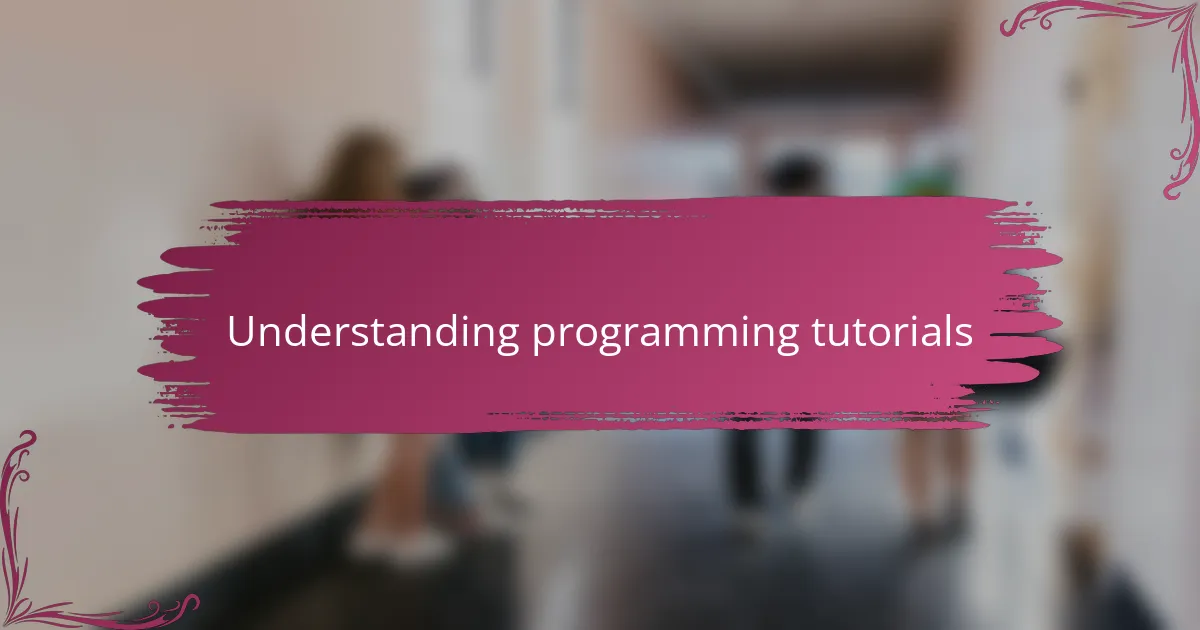
Understanding programming tutorials
When I first dove into programming tutorials, I realized that understanding them isn’t just about following steps—it’s about grasping the why behind each line of code. Have you ever felt stuck because a tutorial made it seem too easy or too rushed? That’s where pausing to reflect and experiment with the examples makes all the difference.
Programming tutorials come in many forms: some are video-based, others text-heavy, and many combine both. I’ve found that mixing these formats helps me connect concepts better, especially when a written explanation doesn’t quite click until I hear the instructor’s voice emphasizing a key point.
What really sets successful tutorials apart is how they balance teaching syntax with problem-solving mindset. For me, the “aha” moments arrived when tutorials encouraged me to tweak code and see outcomes firsthand. This approach turns passive reading into active learning, which is crucial for truly understanding programming.
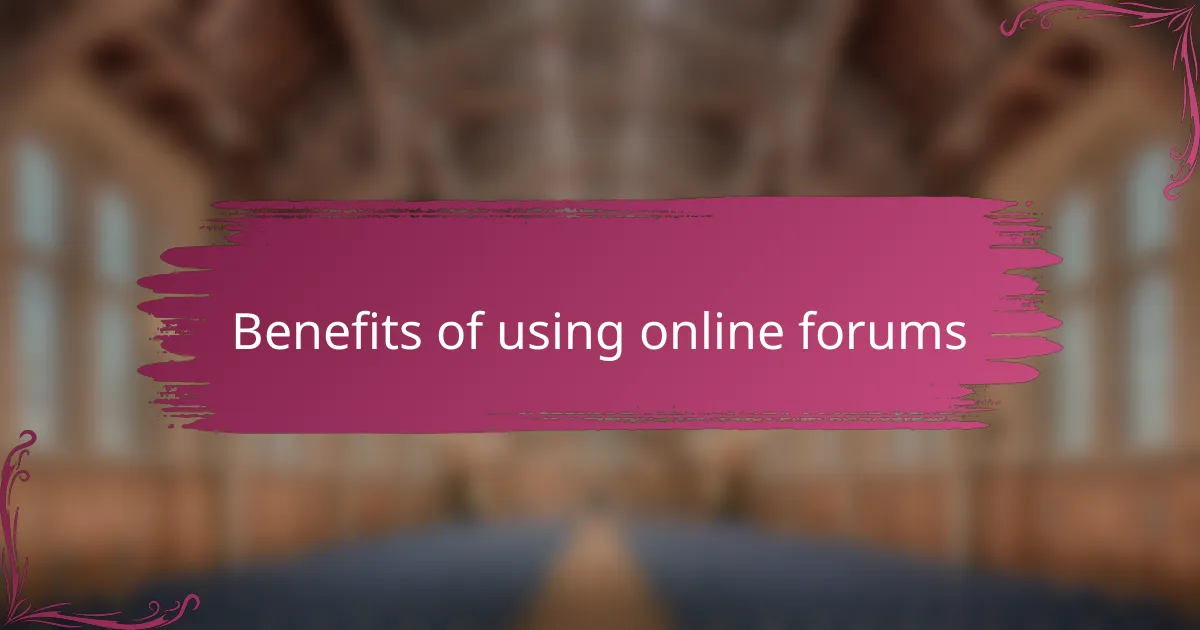
Benefits of using online forums
One of the biggest benefits I’ve experienced with online forums is the chance to learn from real people facing real problems. When I post a question or browse others’ discussions, it feels like I’m tapping into a vast community of programmers who’ve already wrestled with the exact issues I’m encountering. Isn’t it comforting to know you’re not alone in struggling with a tricky bug or concept?
I also appreciate how forums offer diverse perspectives. Sometimes, a fellow coder’s alternative explanation or creative workaround suddenly makes everything click for me. It’s like having a group of mentors available 24/7, each bringing their own style and experience to the table. That variety has saved me countless hours of frustration.
Lastly, the immediate feedback loop is invaluable. Waiting for an expert’s reply or reading through follow-up questions opens a dialogue rather than a one-sided lesson. From my experience, this back-and-forth conversation reinforces learning far better than passively watching a tutorial, because it challenges you to think actively and articulate your problem clearly.
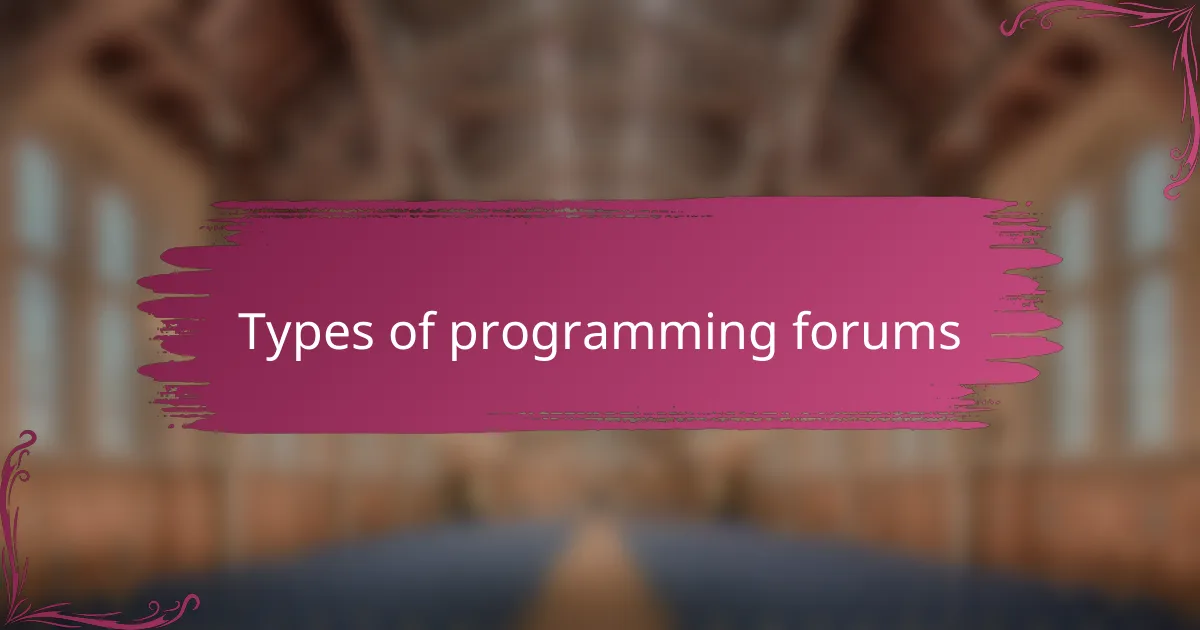
Types of programming forums
When I first started exploring programming forums, I quickly noticed there’s quite a variety to choose from. Some forums are general-purpose, like Stack Overflow, where you can ask anything about coding and expect a wide range of answers. Others are niche communities focused on specific languages or technologies, which often feel more intimate and tailored to your exact needs.
I remember diving into language-specific forums for Python and feeling an instant connection because everyone there shared a common passion and similar challenges. These spaces tend to have a friendlier vibe, almost like a study group where you can discuss not just problems but also best practices and career advice. Have you ever stumbled upon a forum where members seemed to genuinely enjoy helping each other? That’s the kind of environment that makes learning less intimidating.
Then there are specialized forums that cater to certain programming paradigms or frameworks, such as functional programming or web development stacks. Engaging in these can deepen your understanding of the field by exposing you to concepts you might not encounter in general tutorials. From my experience, exploring these focused communities helped me refine my skills and discover new interests I didn’t know I had.
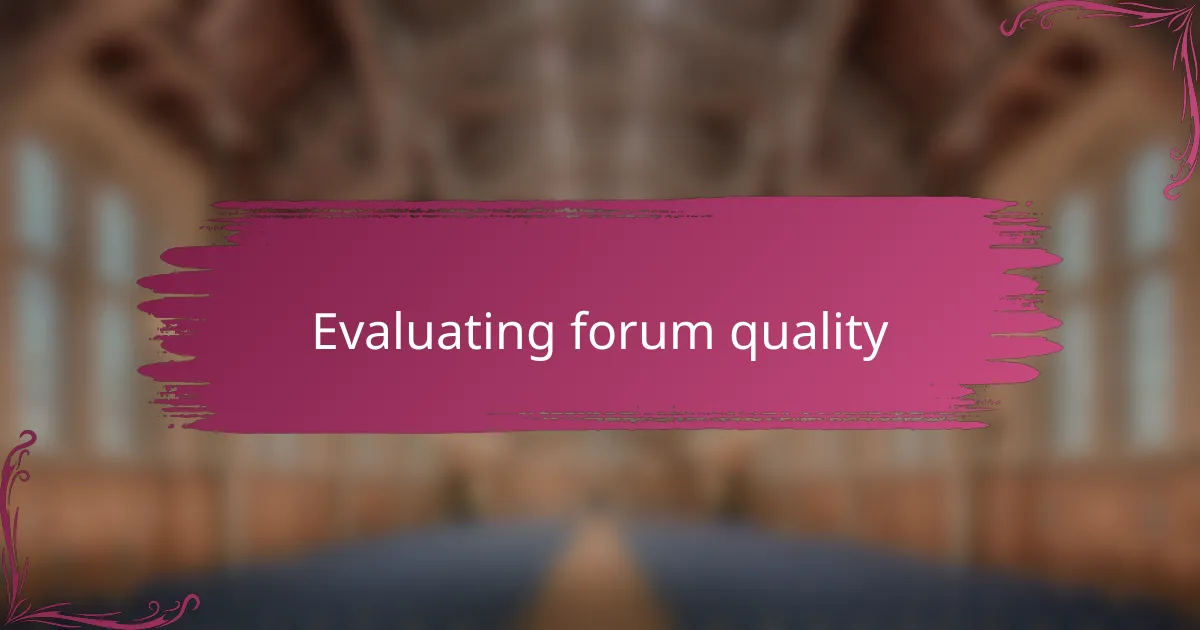
Evaluating forum quality
When I evaluate a forum’s quality, I always start by looking at how active and responsive the community is. Is there a steady flow of recent posts and timely answers? Nothing frustrates me more than asking a question and watching it gather dust for days—good forums avoid that by having engaged members ready to help.
Another thing I pay attention to is the tone and civility of the conversations. Have you ever felt hesitant to post because a forum’s atmosphere seemed harsh or dismissive? Personally, I’ve found that respectful and encouraging communities not only make learning easier but also boost confidence, which is crucial when tackling tricky programming challenges.
I also check the reliability of the advice given. Are the answers backed up with clear explanations, examples, or references? From my experience, forums where users explain the reasoning behind their solutions help me understand better and avoid blindly copying code, which can be a huge trap for beginners.
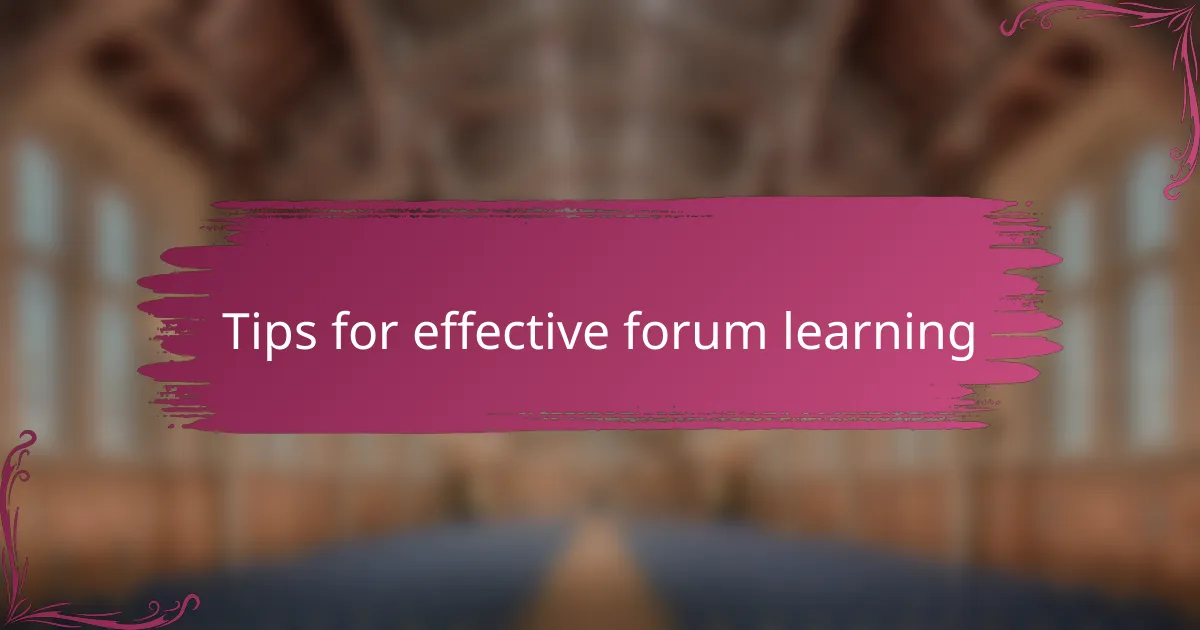
Tips for effective forum learning
One tip I’ve learned is to be patient when asking questions. It’s tempting to want instant answers, but giving people time to respond thoughtfully usually leads to more detailed and helpful replies. Have you ever noticed that the best answers come after some back-and-forth? That’s where real learning happens.
Another thing that works for me is reading through older threads before posting. Often, someone else has already faced the same problem. Skimming through those discussions not only saves time but also helps me frame my question better if I do need to ask. Plus, it’s reassuring to see how others solved difficulties I’m currently wrestling with.
Lastly, I find it crucial to participate actively, not just lurk. Sharing what I learn by answering even simple questions strengthens my understanding and builds connections with the community. Have you tried explaining a concept to someone else? It’s amazing how teaching others can highlight gaps in your own knowledge and push you to dig deeper.
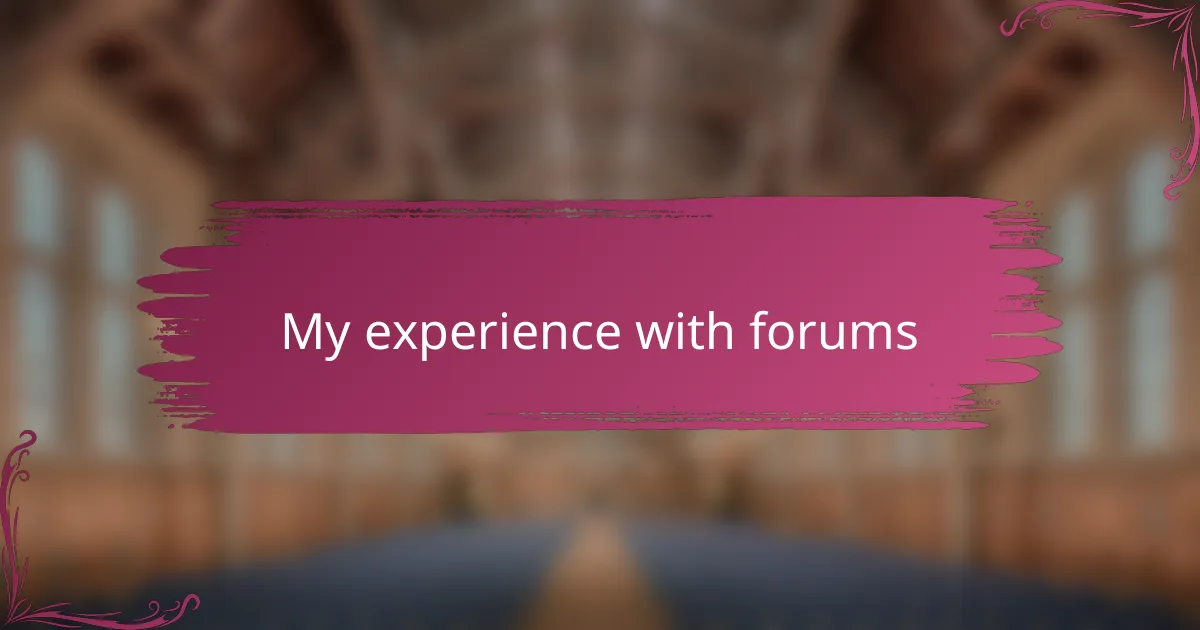
My experience with forums
I remember the first time I nervously posted a question on a programming forum—I wasn’t sure if I’d get any replies, or worse, be ignored. To my surprise, not only did I get answers quickly, but some fellow coders even took the time to explain things patiently and share links to resources. That instant connection made me feel part of a supportive community rather than just a struggling learner in isolation.
Sometimes, I found myself scrolling through long threads late into the night, fascinated by how people dissected complex problems from multiple angles. Those moments reminded me that learning programming isn’t a solo journey; it’s a shared experience filled with collective wisdom. Have you ever felt energized by reading diverse opinions that challenge your thinking?
Of course, not every interaction was smooth. There were times when I encountered terse replies or answers that made me feel more confused. But even those moments taught me resilience and how to phrase questions better. Looking back, those ups and downs in forums mirror real-life learning—imperfect but incredibly valuable.
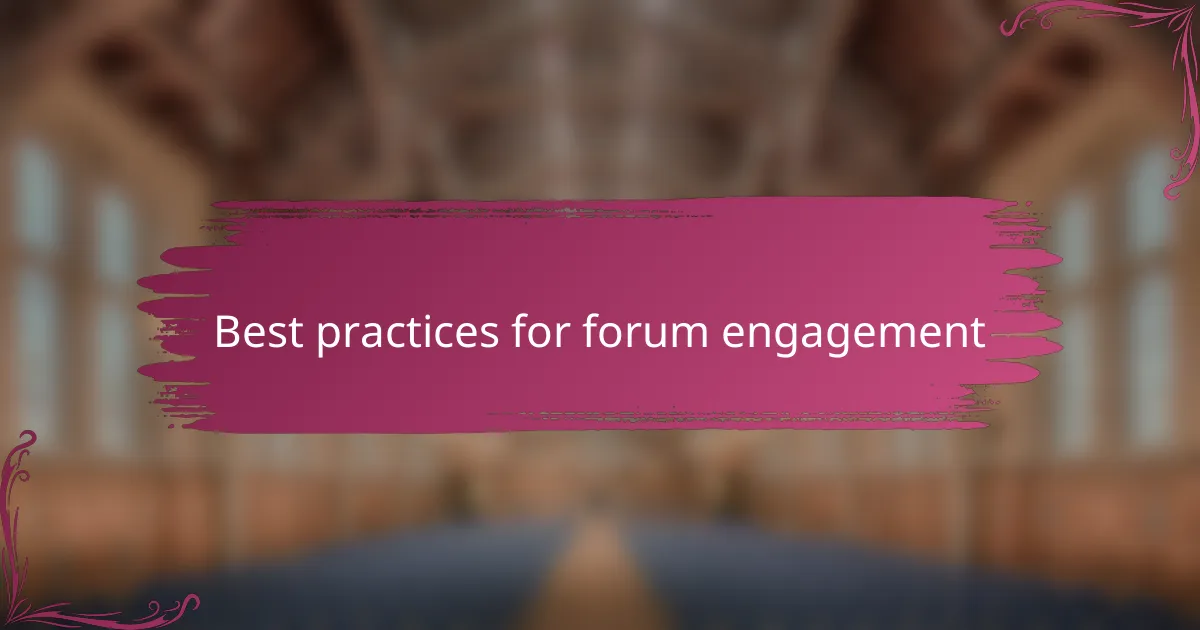
Best practices for forum engagement
When I engage in forums, I make it a point to read existing threads thoroughly before posting. This not only helps me avoid repeating questions but often leads me to spot solutions I might have missed. Have you ever posted a question just to find out moments later that it’s already been answered? That slight pause to search first saves so much time and frustration.
I’ve also found that being clear and specific when asking questions makes a huge difference. Instead of saying “My code doesn’t work,” I try to describe exactly what I expected, what happened, and share relevant code snippets. This clarity invites more precise answers and shows respect for others’ time—something every forum participant appreciates.
Lastly, I’ve learned that giving back is as important as seeking help. Even if I’m a beginner, offering encouragement or sharing a small tip creates a positive cycle of support. Have you noticed how a simple “Thanks” or “That helped!” can brighten someone’s day? Engaging with kindness helps build the kind of community I want to be part of.